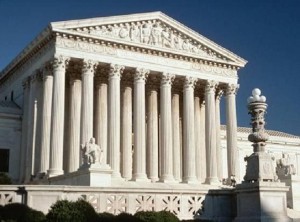Fourth Amendment defended, privacy hawks rejoice over SCOTUS ruling

By Josh Peterson | Watchdog.org
HIGH COURT: ‘Our answer to the question of what police must do before searching a cell phone seized incident to an arrest is accordingly simple— get a warrant,’ Chief Justice John Roberts said in the High Court’s ruling Wednesday.
WASHINGTON, D.C. — The nation’s High Court drew a clear line in the sand Wednesday when it unanimously ruled police must obtain a warrant before searching the contents of a suspect’s cell phone, winning the praise of advocates fearful of the privacy threat citizens face from eager government officials.
The fruits of a global war against Islamic extremism have forced the nation to reassess how federal, state and local law enforcement officials may take advantage of the mobile technologies citizens carry around in their pockets.
“The fact that technology now allows an individual to carry such information in his hand does not make the information any less worthy of the protection for which the Founders fought,” said Chief Justice John Roberts, who wrote the opinion for the High Court.
“Our answer to the question of what police must do before searching a cell phone seized incident to an arrest is accordingly simple — get a warrant,” he said.
Eight of the nine justices signed onto the main opinion, while Justice Samuel Alito wrote a separate opinion stating he would prefer that Congress and state legislatures determine the limits of the warrant requirement.
Cell phones have become a near essential part of daily American life, said 83 percent of wireless customers recently surveyed by MyWireless.org, a D.C.-based nonprofit advocacy organization affiliated with the wireless industry.
The Supreme Court’s ruling extends even to when a suspect is in custody, noting that a cell phone and the data it contains do not pose a threat to the arresting officer. Exceptions for warrantless searches, however, can be made on a case-by-case if the cell phone could put the lives of officers or others in danger.
The High Court even pointed to the nation’s founding, recognizing the privacy protections as an essential to the preservation of American liberty.
“Our cases have recognized that the Fourth Amendment was the founding generation’s response to the reviled “general warrants” and “writs of assistance” of the colonial era, which allowed British officers to rummage through homes in an unrestrained search for evidence of criminal activity,” said Roberts.
“Opposition to such searches was in fact one of the driving forces behind the Revolution itself,” he said.
SCOTUSblog, the popular blog covering the Supreme Court, wrote on Tuesday, “In purely technical constitutional terms, the ruling put strict new technology-based limits on a century-old doctrine on police authority to search — the idea that, once police had arrested an individual, they could search items that person had brought along, in person or within reach in a car. ”
Ilya Shapiro, senior fellow in constitutional studies at the Cato Institute, called the ruling “surprising” because it is “both broad and unanimous.”
“Sweeping rulings on high-profile subjects tend to split the Court, whether ideologically or, in criminal procedure cases like this one, between formalists and pragmatists,” said Shapiro, in a post on Cato’s blog.
“Unanimous rulings, meanwhile, tend to be cautious, splitting the baby in a way that doesn’t significantly change the law. Yet here we have a loud and unified ‘bright-line rule’ that sets a major standard for the digital age,” said Shapiro.
“Kudos to the Court — and raspberries to the federal government, which has now had its expansive arguments rejected unanimously 11 times since January 2012,” he said.
The ruling was a win for privacy advocates who have been battling relentlessly against law enforcement agencies’ warrantless searches of citizens’ digital lives.
Steven Shapiro, the national legal director of the American Civil Liberties Union, applauded the decision as “revolutionary.”
“We have entered a new world but, as the court today recognized, our old values still apply and limit the government’s ability to rummage through the intimate details of our private lives,” said Shapiro.
Hanni Fakhoury, staff attorney for the Electronic Frontier Foundation, a San Francisco-based digital rights advocacy organization, said that the ruling was “huge for digital privacy.”
“This should have implications for other forms of government electronic searches and surveillance, tightening the rules for police behavior and preserving our privacy rights in our increasingly digital world,” said Fakhoury.
Contact Josh Peterson at jpeterson@watchdog.org Follow Josh on Twitter at @jdpeterson







